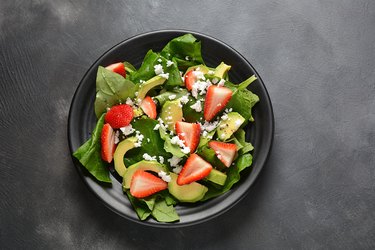
The bloated feeling you get when your digestive system is full of gas is something most people can relate with. However pinning down what causes the discomfort — the foods, drinks and specifically fruits and vegetables that make you gassy — isn't always easy.
Tip
If you’re in the “salad-makes-me-gassy” gang, don’t blame lettuce too much. In fact gas from eating lettuce isn’t probable, and it’s likely the other veggies on your plate that will be causing the problem.
Video of the Day
It's worth a reminder that producing gas is a normal, healthy part of digestion. The International Federation for Gastrointestinal Disorders (IFFGD) says people often believe normal passage of gas to be excessive. How we respond to foods that produce gas and how badly we perceive the discomfort to be is very individual.
Video of the Day
Carbohydrates are the Culprit
According to the IFFGD, it's the carbohydrates in your diet that cause gas; fat and protein are much less troublesome in this respect.
Gas is produced when certain sugars, starches and fibers get broken down by harmless bacteria naturally present in the large intestine. Lettuce has only 1 gram of carbohydrate in a cup according to USDA figures, which is why you are unlikely to experience much gas from eating lettuce.
Foods more likely to cause gas include:
- Beans, though pre-soaking and discarding the soaking water can reduce the gas-producing potential
- Vegetables, especially artichokes, asparagus, broccoli, cabbage, Brussels sprouts, cauliflower, cucumbers, green peppers, onions, radishes, celery and carrots
- Fruits such as apples, peaches, raisins, bananas, apricots, prune juice and pears
- Some high-fiber foods, like whole grains and bran
- Milk and milk products, such as cheese and ice cream
- Packaged foods containing lactose, which might include bread, cereal and salad dressing
- Foods containing sorbitol, such as dietetic foods and sugar-free candies and gums
Carbonated drinks — diet drinks and fizzy water as well as sugary ones — may also contribute to gas, but in this case it is the carbon dioxide in them that is the problem.
Read more: Why do Carbs Make me Bloated?
Eating to Reduce Gas
Cutting down too drastically on plant foods isn't the best option to fight flatulence, as plant foods can help you lose weight and also reduce your risk of heart disease, according to Harvard Health Publishing.
However, you can adjust your diet and choose fewer of the fruits and vegetables that make you gassy. The IFFGD confirms you won't get much gas from eating lettuce, but also recommends gas-prone individuals try tomatoes, zucchini, okra, cantaloupe, grapes, berries, cherries, avocado and olives. When it comes to grains, gluten-free options and rice are less likely to result in gas production.
The National Institute of Diabetes and Digestive and Kidney Diseases says as well as eating fewer of the foods that give you gas, having smaller, more frequent meals may additionally work to ease flatulence.
Read more: 10 Surprising Flat-Belly Foods
You may also get relief from the over-the-counter medicine alpha-galactosidase (sold as Beano and Gas-Zyme 3x). It contains the enzyme the body lacks to digest the complex sugar molecules in the beans, grains and vegetables that make you gassy. Take it just before meals to obtain relief.
In cases where gas is a symptom of irritable bowel syndrome (IBS), the FODMAP diet might work for you (FODMAPs stands for fermentable, oligo-, di-, monosaccharides and polyols). The American College of Gastroenterology explains that FODMAPs are the sugars that gut bacteria ferment, turning them into gas and chemical. A FODMAP diet, which requires the complete exclusion, and then careful reintroduction, of culprit carbs has a good success rate in people with IBS.
Should you want to try the FODMAP diet, a consultation with a registered dietitian nutritionist is highly recommended. You can find a list here.
- IFFGD: "Tips on Controlling Gas"
- USDA: "Lettuce, Raw"
- Harvard Health Publishing: "The Right Plant-Based Diet for You"
- National Institute of Diabetes and Digestive and Kidney Diseases:"Treatment for Gas in the Digestive Tract"
- American College of Gastroenterology: "Low-FODMAP Diet"
- Academy of Nutrition and Dietetics: "Find an Expert"
Is this an emergency? If you are experiencing serious medical symptoms, please see the National Library of Medicine’s list of signs you need emergency medical attention or call 911.